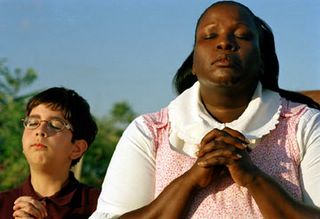Palindromes
Thanks to my new friend Michelle, I got into a sold out sneak preview of the new Todd Solondz film Palindromes. This is a director I've liked and admired for some time, ever since Welcome to the Dollhouse. He makes unique films, movies that touch on extremely sensitive, uncomfortable topics in a humane, direct and most importantly humorous context. I can't think of another filmmaker who manages to satirize America so sharply, and yet come away seeming good-natured and inclusive.
To explain what I'm talking about, let's consider another popular American satirist - Alexander Payne. Or more specifically, let's take his wonderful satire Election. That's a film with a lot to say about American politics and the way humanity interacts with beurocracy. But it can also be a mean-spirited and cold film, dissecting its characters with precision and, occasionally, contempt. Solondz films instead confront us with characters doing either reprehensible things, shameful things, embarrassing things or degrading things and then asking us not only to accept them but love them.
With Palindromes, he's made a frank film about pregnancy and abortion in America. It's a movie with a clear viewpoint that nonetheless manages to see both sides of these issues. Don't get me wrong - Solondz obviously has an opinion on abortion. At the Q&A following the movie, he referred to abortion doctors as "heroes," if that gives you an idea of where he stands. And the film doesn't sell out his opinion for some bogus notion of inclusiveness.
But it does give you a sense that everyone thinks they are on the right side of this issue, and it allows you to understand the commonality of that feeling, at the very least. It's an essential human trait to embrace ones position against all others, to identify by ones allegiances, and the argument about a woman's right to choose hits at the very core of American's divergent attitudes on faith and medicine.
It's also his warmest, most visually impressive and quite possibly best film.
I've already spent two paragraphs on Palindromes without discussing the conceit lying at its heart. My bad. The film concerns one 13-year old female protagonist named Aviva, who is played in various segments by a variety of actresses. Sometimes, the actress playing Aviva resembles the character's "actual" race and age (a 13 year old white girl). But in some scenes, she's played by an obese, full-grown black woman (that's her above), a boy or Jennifer Jason Leigh.
Aviva's story takes her from her parent's home (Ellen Barkin and Richard Masur) in New Jersey clean across the country to Kansas. She's run away from home after being forced into getting an abortion. After taking up briefly with a trucker, she finds herself at the home of Mama and Bo Sunshine, a religious couple who have taken in a variety of troubled, disabled children. And this is where the film forces a variety of conflicts between Aviva and her new family, allowing Solondz a chance to explore the craggy terrain of American politics without ever abandoning the very human story at the film's center.
I could explain for you why Solondz chose to cast his film this way. If you watch the movie, you'll probably understand what he's getting at. But giving it away in this review wouldn't really be fair. Suffice it to say, he did this for a reason, it connects to the film's plot and it's not a stunt. And it also gives him a chance to explore the character in a variety of ways. Some actresses play Aviva as sullen, shy and almost eerily silent. The lone male, Will Denton, doesn't speak a word as Aviva at all, though his segment may be the film's most visually splendid and well-conceived.
The film links up narratively with Solondz's breakthrough indie hit Welcome to the Dollhouse. Aviva's family is cousins with the Weiner's, the family at the center of that film, and nerdy older brother Mark Weiner appears during a few crucial sequences of Palindromes. But this is no Kevin Smith-style self-referential humor. The films are tied thematically, keenly observing trauamtic, alienated adolescence with a sharp eye for detail and a cynical, almost dire, outlook.
We laugh at Solondz's films because of the outrageousness and witty dialogue, and because of their sheer audacity. But the films are almost uncomfortable in a way because of their intense observation, their acute realism. I'm reminded of the long sequences in Happiness, in which Dylan Baker's suburban father drugs his young son's friend in order to molest (and possibly rape) him. Baker wears a look we can recognize - he's terrified of being caught, by kind of exhiliarated by the thrill of getting away with something.
Hopefully, none of us can relate to that specific situation. But we can relate to that feeling. We've all done something we're not proud of, something we hoped and prayed no one we know would ever see, and regardless of what that thing specifically is, all of us recognize that aspect of Baker's situation. So, even with this villainous pedophile, we share some common humanity.
That might be the singular theme of Solondz's films. He focuses on extreme outcasts and then forces us to recognize the massive amount that we share with these people. And Palindromes makes this point while being extraordinarily entertaining and artfully made. I've enjoyed all of his films up until now, Happiness being my favorite, but this may be the man's best yet. It opens in cool cities on April 15th.

No comments:
Post a Comment